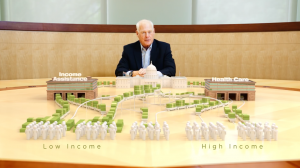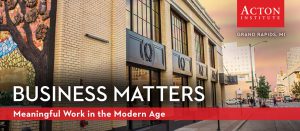


With so many people around the world in moderate or full quarantines and lockdowns, many of them are turning to books to pass the time, ease their fears, or simply take advantage of an unexpected and involuntary opportunity to recharge their intellectual batteries. This being the case, I’d like to offer a short summary of some of the lesser-known books written by one of my favorite thinkers, the German economist Wilhelm Röpke, in the hope that it may entice some readers to learn more about him and his contributions to political economy.
Röpke is perhaps best known as one of the intellectual architects of the postwar market-driven German economic miracle. He was, however, also a genuine polymath. Fluent in modern and ancient languages, a market liberal and a believing Christian, Röpke was fortable speaking about the finer points of business cycle theory as he was in discussing Augustine’s “City of God.”
Perhaps Röpke’s most famous work is “A Humane Economy: The Social Framework of the Free Market,”which first appeared in German in 1958 and was acclaimed by both the New York Times and the Wall Street Journal when it was published in English in 1960. Over the course of his life, Röpke wrote prolifically, authoring several books, dozens of academic pieces and untold numbers of newspaper articles, penning over 900 publications by the end of his life. Many of his writings exerted a profound influence on prominent American conservatives such as William F. Buckley and Russell Kirk. Here are some of his texts that may not be so familiar to American and European audiences.
“Crises and Cycles” (1936): Like many economists in the interwar years, Röpke was preoccupied with understanding the causes of the Great Depression and analyzing the prospects of various remedies. Written during his first years of exile in Turkey, this book squarely addresses those issues and examines the various proposals put forward by figures ranging from F.A. Hayek to John Maynard Keynes. The book, Röpke laments in his preface, was already typeset just when Keynes’ “General Theory” appeared. In later years, Röpke became an outspoken critic of Keynes and Keynesianism, but one can see in “Crises and Cycles” the foundations of that critique and why Röpke regarded Keynes as the father of a type of economics that, in his view, damaged mon good.
“Economics of the Free Society” (1937): In many ways, this is my favorite Röpke book. Initially published in Austria one year before the Anschluss, it went through 9 German editions and appeared in multiple languages. The economist Ludwig von Mises, who had many strong intellectual disagreements with Röpke, thought so highly of this book that he mended that it be published in English. The attraction of the text is that it outlines in clear and accessible language the foundations of economics, the problem with which economics wrestles and seeks to answer, and the ways in which sound economics can bolster free societies.
“The Social Crisis of our Time” (1942): Written in Switzerland in the midst of World War II, this book first brought Röpke to the attention of the world outside the German-speaking lands. Its impact was such that the Nazi regime banned its publication in Germany and all German-occupied territories. The book marks Röpke’s first effort to trace systematically the deeper historical roots of the multi-faceted crisis gripping the Western world, and Röpke does so by drawing on a range of economic, political, and theological sources. Many of the economic ideas contained in this book were to profoundly influence Ludwig Erhard’s liberalization of the West German economy in 1948.
“The German Question” (1945): Initially written at the request of the British Foreign Office, Röpke’s account of the reasons for the German catastrophe of National Socialism had the equivalent effect in Germany that Hayek’s “Road to Serfdom” (1944) had in Britain and the United States. Most of this book involves explanation of different currents in German high culture, but also links these to economic errors made by successive German government from the time of German reunification onwards.
“International Order and Economic Integration” (1954): This books reveals Röpke’s deep knowledge of the history of international law as well as the depth of mitment to free trade. He shows the ways in which the spread of economic liberty inside and across national borders can be a source of prosperity for all, as well as the political and economic problems associated with protectionism and autarky. At the same time, Röpke underscores his opposition to top-down schemes for European unification and makes clear his opposition to the political project that would e the European Union.
This is just a sampling of Röpke’s books, most of which are available in English. Those looking for a representative collection of some of the most important of Röpke’s articles should look to the superb essays assembled and edited by my Acton colleague Daniel A. Hugger in “The Humane Economist: A Wilhelm Röpke Reader” (2019). An excellent short book on Röpke’s life and thought, “Wilhelm Röpke: Swiss Localist, Global Economist,”was written by Acton University lecturer John Zmirak in 2000. For those looking for a deeper dive into the specifics and development of Röpke’s economic thought, there is always “Wilhelm Röpke’s Political Economy” (2010), written by yours truly.
It’s certainly not the case that e away from reading Röpke’s works agreeing with everything he says. Over his lifetime, Röpke changed his mind about several important topics. But perhaps the most impressive dimension of Röpke’s thought is the way he wrestles with different economic questions from a truly interdisciplinary standpoint. And make no mistake: his lodestar is nothing more and nothing less than the truth. That, in the end, is what really matters.









